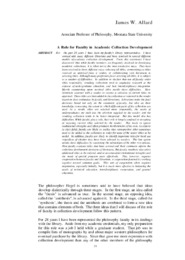| dc.description.abstract | For the past 28 years 1 have been my faculty's library representative. I have worked with many different librarians and been involved in several different models of academic collection development. From this experience 1 have discovered that while faculty members are frequently involved in developing academic collections, it is often not in the most productive ways. They have been involved in three different ways: selecting all titles, commenting on titles received on approval from a vender, or collaborating with librarians in selecting titles. Although many professors favor selecting all titles, it is subject to a number of difficulties. In addition to the fact that not all faculty order titles responsibly, resulting collections tend to emphasize research at the expense of undergraduate education, and lack interdisciplinary integration. Merely commenting upon received titles avoids these difficulties. Here librarians contract with a vender to receive a selection of current titles on approval. These titles are then added to the collection or returned to the vender based on their evaluation by faculty and librarians. Librarians make the final decisions based not only on the comments of faculty, but also on their knowledge concerning the extent to which different parts of the collection are used. As a result, titles are selected more responsibly, the needs of undergraduates are built into the selection supplied by the vender, and the resulting collection tends to be better integrated. But this model also has difficulties. While faculty play a role, their role is largely confined to accepting or rejecting current titles selected by the vender. This tends to ignore institutional strengths and often produces incoherencies of its own. As experts in their fields, faculty are likely to realize that retrospective titles sometimes need to be added to the collection in order for some of the newer titles to be useful. In addition, faculty are likely to identify important titles for local use regardless of whether they have been selected by venders. The last option avoids these difficulties by combining the advantages of the other two options. Here faculty evaluate titles that have arrived and their comments inform the collection development decisions of librarians. But faculty members also select additional titles to be ordered, and so accommodate institutional strengths and the needs of special program more effectively. This, however, requires cooperation between faculty and librarians, a cooperation fostered by working together toward common goals. This sort of cooperation often requires negotiation, especially initially, but it is much more effective in balancing the needs of technical education, interdisciplinary cooperation, and general education | en |
